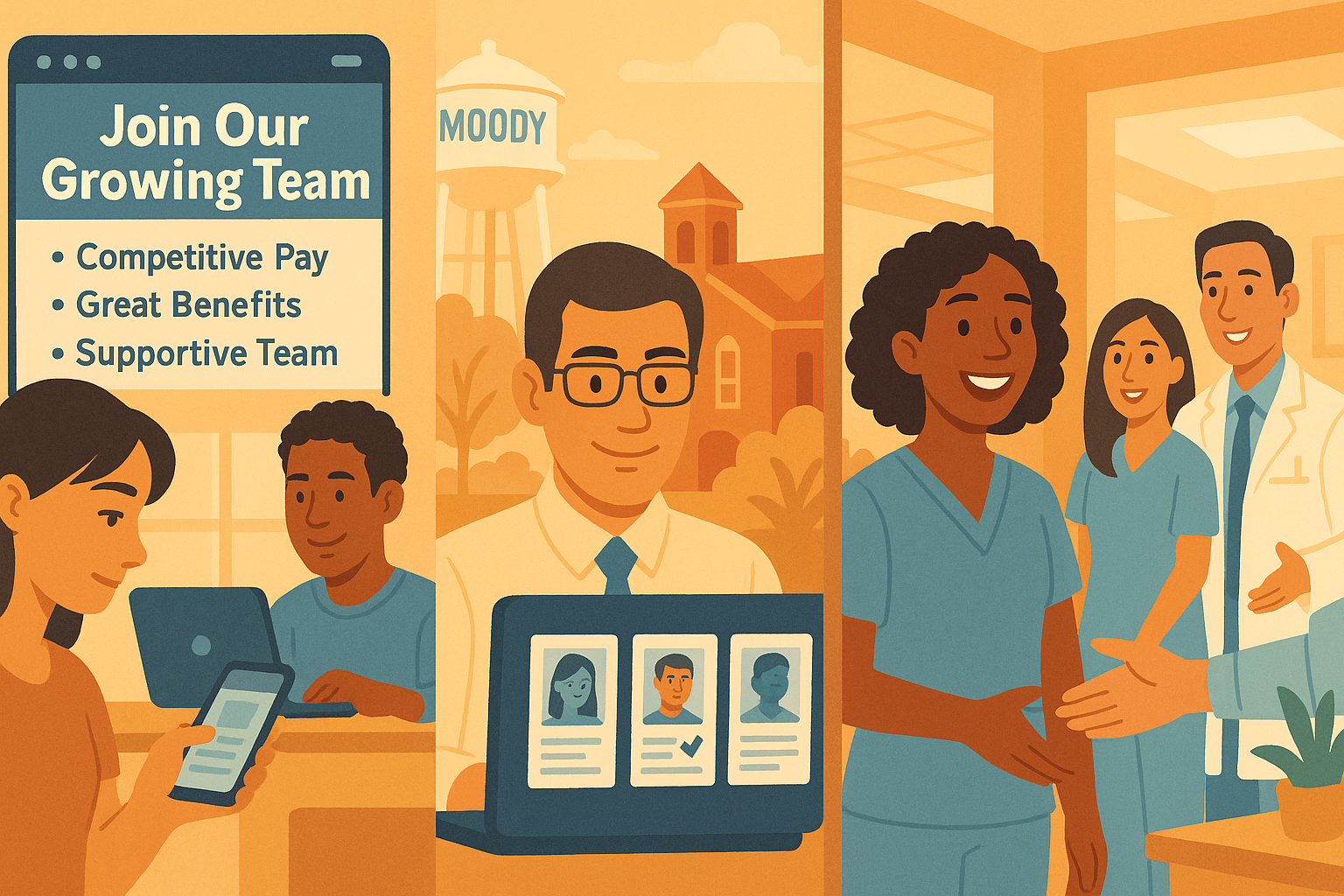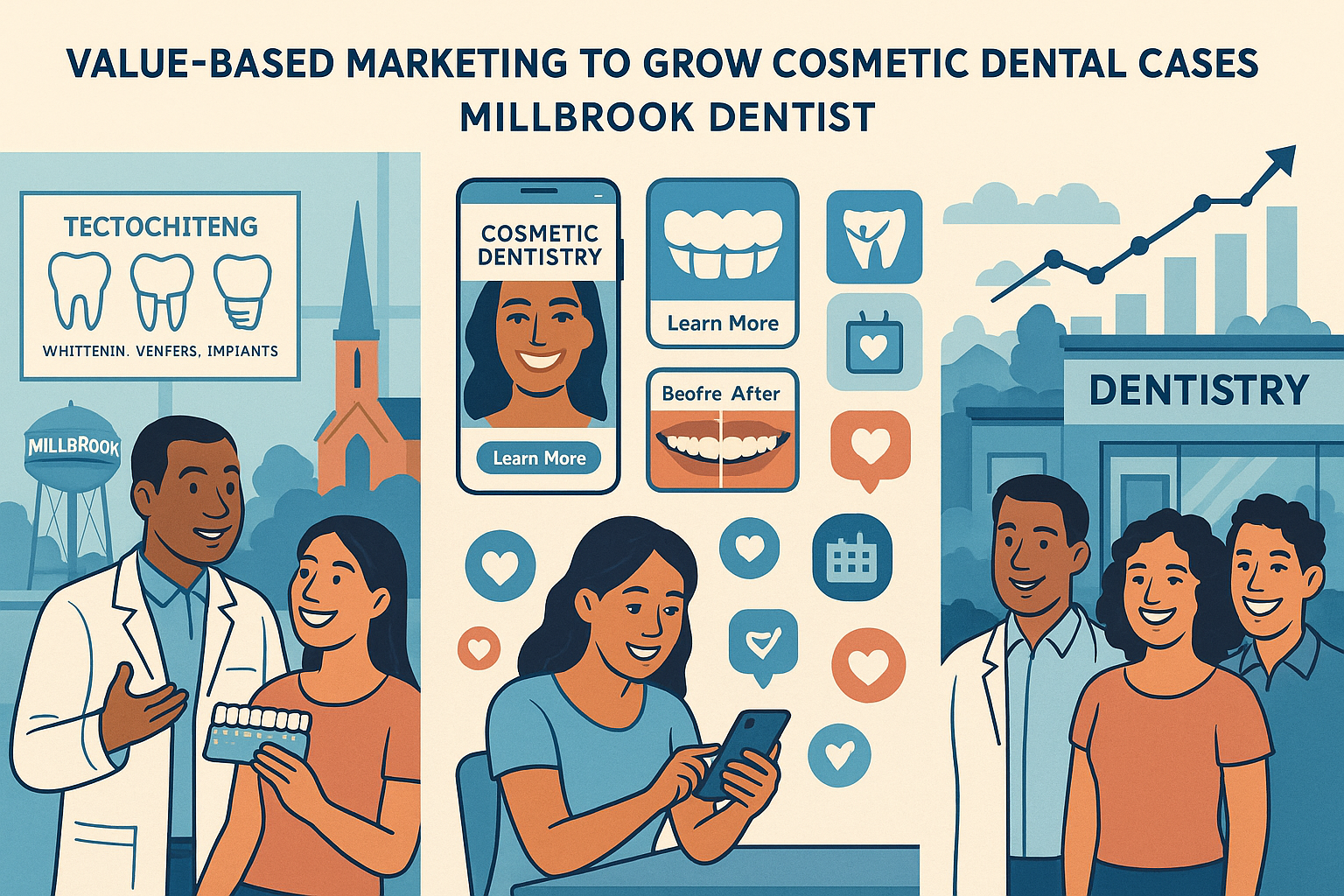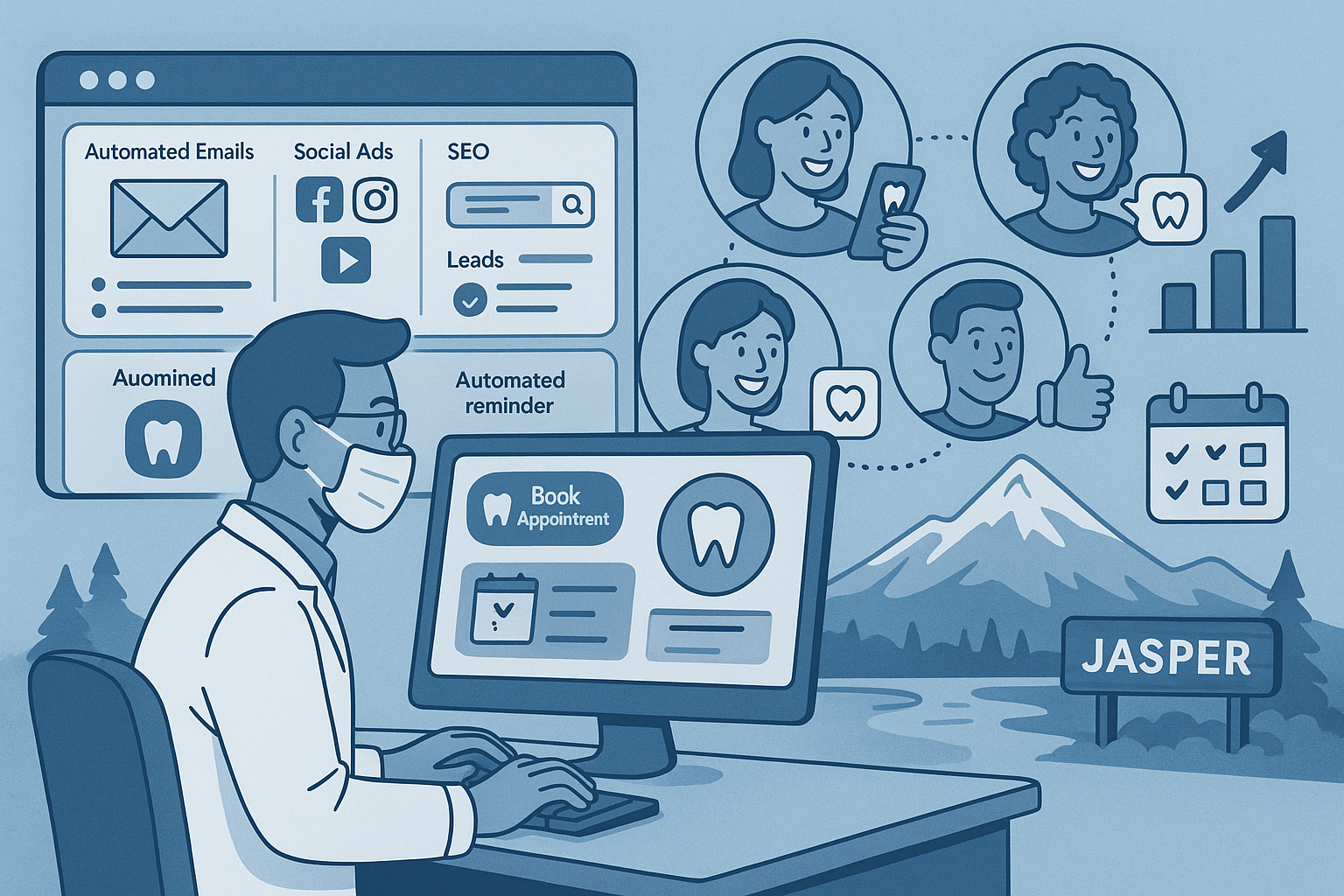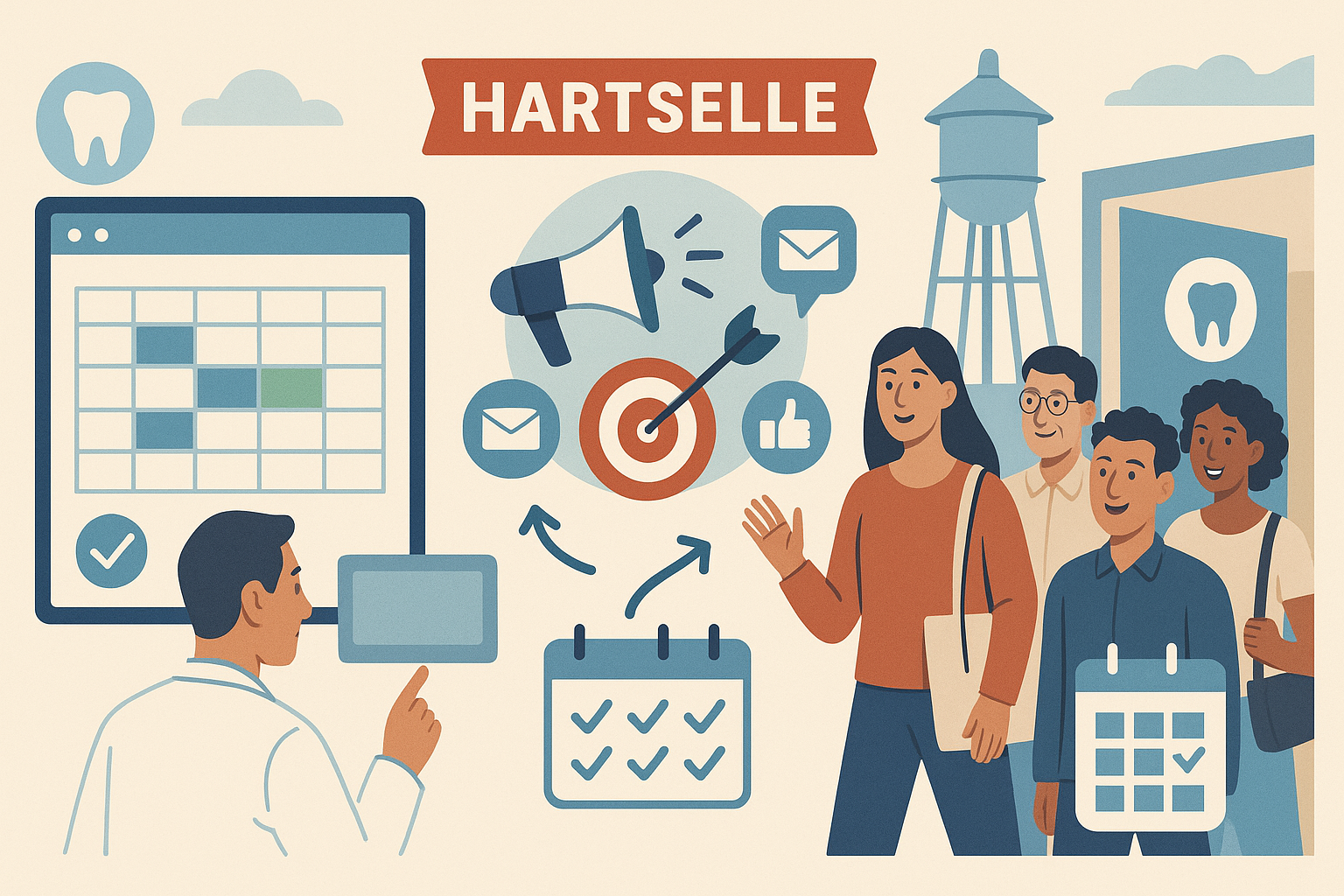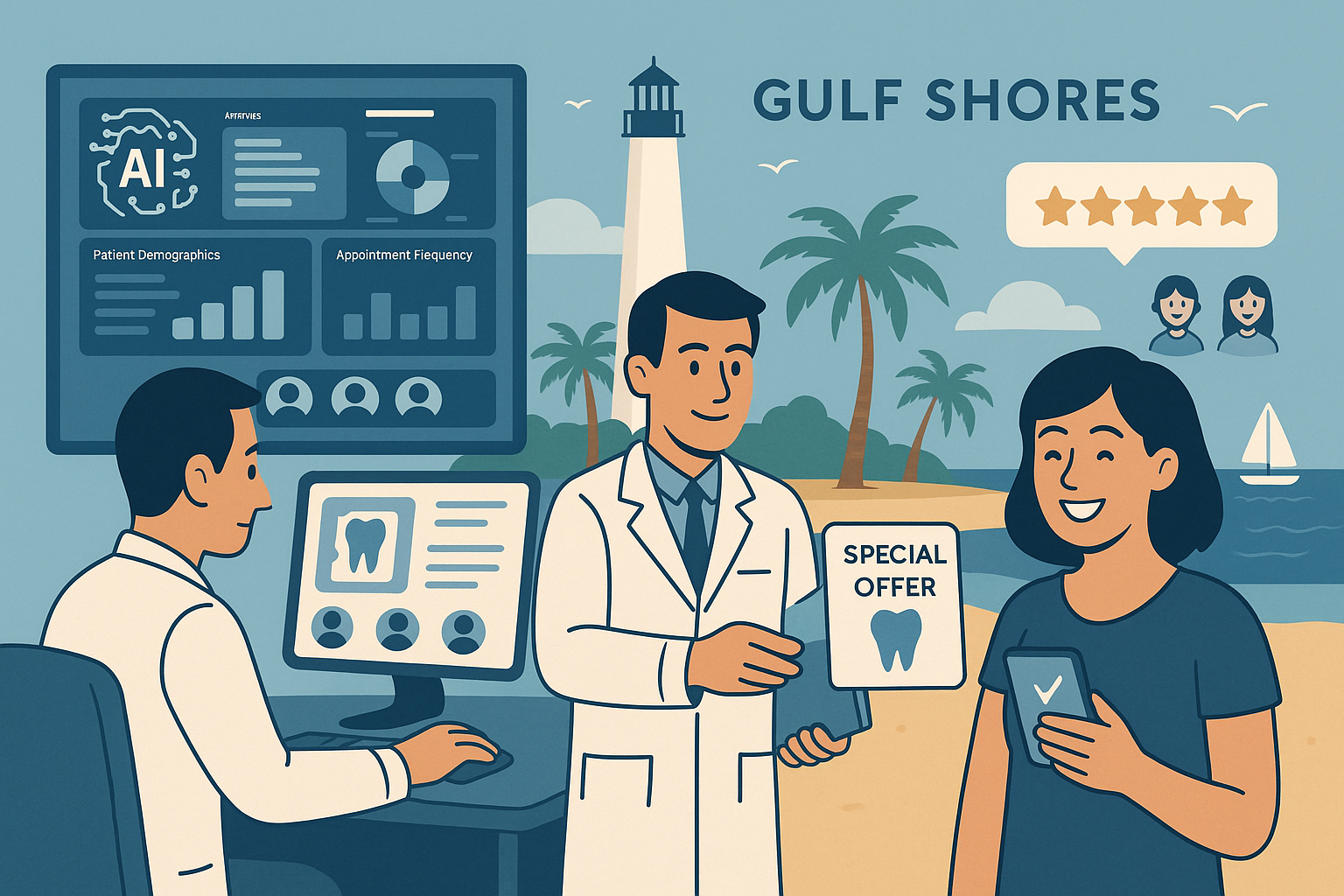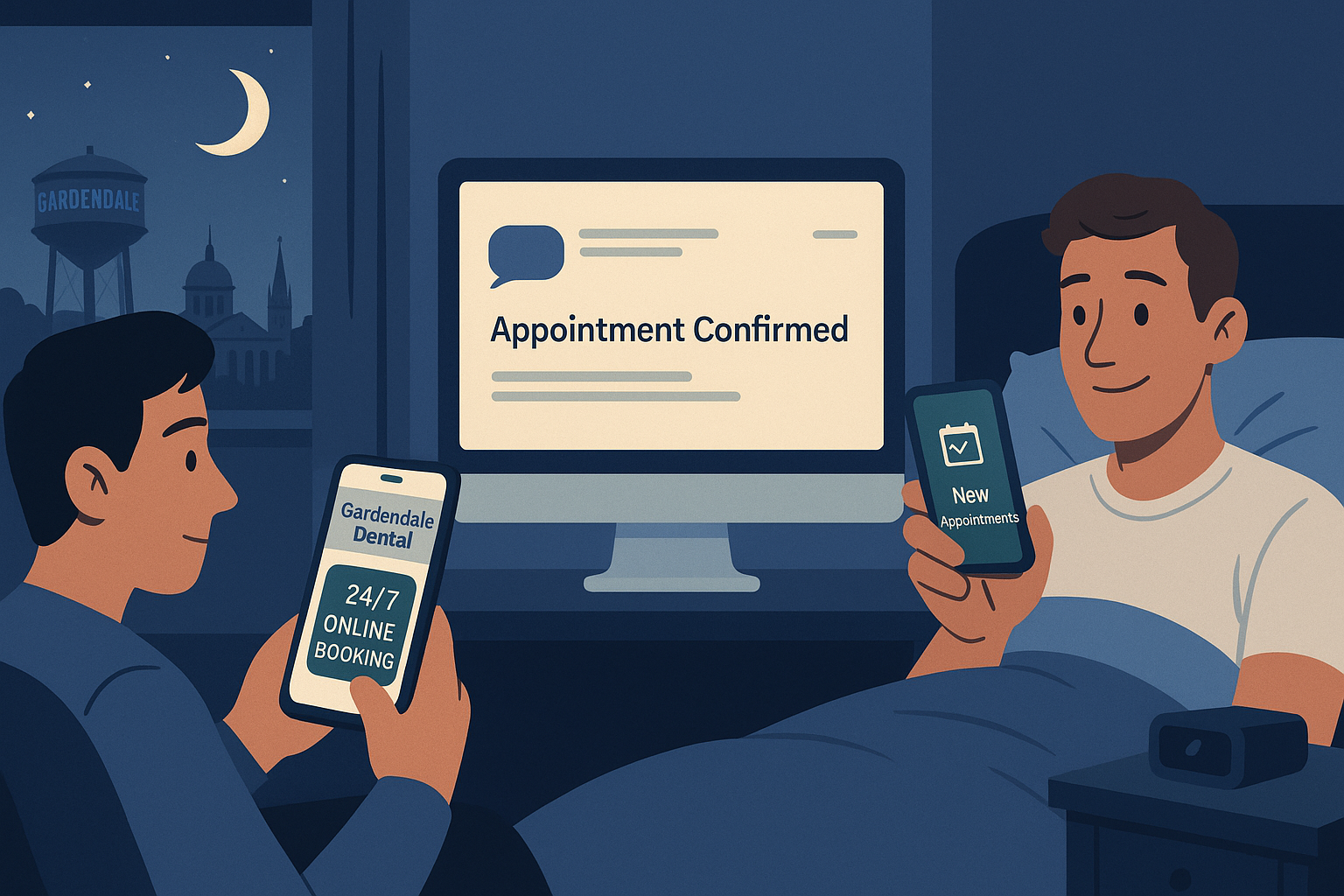Dental Marketing in Gardendale: Book Patients While You Sleep
September 1, 2025
Imagine waking up to a full appointment calendar that filled up overnight. Dental marketing in Gardendale practices are discovering that this isn’t a fantasy – it’s the reality of AI chatbots in dentistry.
In this blog, we’ll explore how Dental marketing in Gardendale acts as virtual receptionists, booking patients even while you and your staff sleep. We’ll dive into why today’s patients love this 24/7 convenience, how it benefits local practices, and how it fits into a broader digital marketing services strategy for dentists.
Let’s unlock the secrets behind Gardendale dentists booking patients in their sleep.
The Rise of AI Chatbots in Dentistry
AI isn’t just for diagnosing X-rays or managing records – it’s transforming front-office operations too. Chatbots in dentistry have quickly gone from novelty to necessity.
These intelligent assistants live on your website (or messaging apps), ready to engage patients at any hour. They use artificial intelligence to simulate human conversation, answering questions and guiding patients through tasks.
In fact, the majority of consumers have interacted with a chatbot before; one survey noted 88% of users have used a website’s live chat assistant, so patients are increasingly comfortable with AI-driven communication. Dental offices are catching up to this trend and leveraging chatbots as an “AI receptionist” that never clocks out.
Gardendale practices, like many others, are embracing chatbots to meet modern patient expectations. Today’s patients expect instant, convenient service – whether they’re asking about a treatment or trying to book an appointment. Offices that rely only on phones and business-hour callbacks risk losing those leads.
As one dental technology expert put it, “AI chatbots and voice systems can answer basic questions, provide directions, confirm appointments, and share office policies any time of day — even when your team is off the clock.” In other words, an AI chatbot gives your practice a friendly, always-on presence online, bridging the gap between patient needs and staff availability.
24/7 Patient Booking – Book Patients While You Sleep
One of the most game-changing benefits of an AI dental chatbot is 24/7 appointment booking. Think about how many potential patients browse for dentists at night after work or on weekends.
By 8 PM, your Gardendale office may be closed – but an AI chatbot is wide awake. It can handle the inquiry immediately and even schedule an appointment for that patient. This means your practice is effectively open for booking while you sleep.
Statistics underscore how crucial after-hours booking is. Industry research shows about 40% of all appointments are booked after business hours, and roughly 67% of patients prefer to book appointments online rather than calling in.
People today often look for dental care in the evenings when they finally have downtime. As a result, practices that enable instant online self-scheduling capture those appointments that would otherwise be missed.
Even if only a fraction of patients currently book late at night, that number is growing every year – and each after-hours booking is one you might have lost to a competitor.
Example: A busy parent in Gardendale gets home at 10 PM and remembers they need to schedule their child’s dental checkup. Your office is closed, but your website’s chatbot cheerfully replies, “Sure, let’s get that appointment booked!” It offers available slots for next week, the parent confirms an opening, and boom – the appointment is set.
By morning, your staff sees a new booking on the calendar that came in at 10:15 PM, no phone tag or voicemail required.
This 24/7 booking capability is a huge advantage. Patients no longer have to wait until the next day (when they might forget or get too busy) to call your office. They get instant gratification, and your practice gets the appointment locked in.
Dental clinics typically closed at 5 or 6 PM can now keep “booking hours” around the clock. As one dental marketing guide noted, people often want to book their dentist appointment after their own 9-to-5 workday, but by then the dental office is closed. An AI chatbot solves that dilemma by making sure your practice is available anytime patients are ready to take action.
What Can an AI Chatbot Do for Your Dental Practice?
An AI chatbot isn’t just an appointment scheduler – it’s more like a multi-tasking virtual assistant for your practice. Modern dental chatbots can handle a surprising range of front-desk tasks.
Here are some of the key things an AI chatbot can do automatically for your clinic:
- Instant Answers to FAQs: Provide quick responses to common questions about office hours, services, insurance accepted, or pre-visit instructions. For example, “Do you take my insurance?” or “What are your hours on Saturday?” can be answered immediately without tying up your phone lines.
- Appointment Scheduling & Rescheduling: Integrate with your practice management calendar to let patients book appointments or even reschedule and cancel, all through a chat interface. No more phone tag or waiting on hold – booking a visit becomes as easy as messaging a friend.
- After-Hours Triage: Assist patients who have urgent concerns or dental emergencies during off hours. The chatbot can ask a few questions and guide them on next steps (ex: directing them to an emergency line, or booking the earliest available slot in the morning), ensuring no panicked inquiry goes unanswered.
- Collecting Patient Information: Gather basic info from new patients (name, contact, reason for visit) or prospective patients looking to be contacted. The chatbot can securely collect these details so your staff can follow up, effectively capturing leads even at midnight.
- Appointment Reminders and Follow-ups: Some AI systems can send automatic reminders, pre-visit instructions, or even post-visit follow-up messages. For instance, it might message a patient a day before their appointment to confirm or provide post-op care tips after a procedure.
By handling these tasks, the chatbot takes a load off your front desk. It’s like having a receptionist on duty 24/7, but one that can juggle multiple conversations at once and never gets tired or overwhelmed.
Patients benefit by getting immediate, accurate information. Your team benefits by being freed from repetitive questions and after-hour messages waiting in the morning.
Crucially, these chatbots use AI to understand user inquiries and intent. Unlike old-school scripted bots that only spit out preset answers, today’s AI-powered dental chatbots can learn from each interaction.
They recognize variations of questions (e.g., “My tooth hurts, what do I do?” vs. “I have tooth pain”) and provide helpful answers consistently. Over time, they improve at guiding patients. And whenever a question falls outside its knowledge (say, a complex insurance issue), the chatbot can politely notify the user that a human will follow up.
This way, patients are never left hanging – the bot does what it can and seamlessly hands off when it must.
Benefits of AI Chatbots for Dental Practices
Implementing an AI chatbot yields tangible benefits for your dental practice. It’s not just about automating tasks for the sake of it – it’s about improving your efficiency, your patient satisfaction, and ultimately your bottom line.
Here are some of the standout benefits Gardendale dentists are seeing with AI chatbots:
1. More Appointments & New Patients
Chatbots convert website visitors into booked patients. Many people visiting your site might be on the fence or “just browsing” after hours. A chatbot engages them proactively (“Hello! Have a question or want to schedule an appointment?”) and can nudge them toward booking. The result is more appointments on your books.
In fact, dental practices that use AI chatbots have reported significant bumps in new patient bookings. One case study found that an AI chatbot helped a practice secure an average of 2–4 additional new patient appointments per day.
Over a month, that added up to dozens of new patients and substantial revenue that the practice might have otherwise missed. Simply put, a well-trained chatbot ensures no potential patient slips through the cracks, day or night.
2. Convenience Boosts Patient Satisfaction
Today’s consumers love convenience, and healthcare is no exception. Offering a 24/7 chat and booking option is a huge win for patient experience. Patients appreciate getting instant answers and being able to take action (like scheduling) without delay.
This convenience translates to goodwill and loyalty. For example, if a patient gets their question answered at 11 PM about a toothache and books a next-day appointment through the chatbot, they’ll likely be impressed by your responsiveness. You’ve addressed their need immediately.
Surveys have shown that practices using AI-driven communication see higher patient satisfaction scores – some report increases over 30%–40% in patient satisfaction thanks to faster service and better communication transparency.
Happy patients are more likely to show up for appointments, accept treatment plans, and refer friends. By meeting patients where and when they are ready, you build a stronger patient-practice relationship.
3. Reduced Staff Workload & Operational Savings
For your front desk and office staff, the chatbot is a real lifesaver. It filters out the routine inquiries that normally would tie up the phone lines or pile up in your inbox.
Common questions get answered automatically, appointments get booked automatically – meaning your team spends less time on back-and-forth phone calls and data entry. This not only reduces stress and burnout, it also improves efficiency during the workday.
Your receptionist can focus on the in-office patients and complex tasks, rather than answering “Do you take Blue Cross insurance?” for the tenth time that week.
There’s a clear financial upside to this efficiency. By handling many administrative tasks, chatbots effectively cut down on the need for extensive administrative staffing or overtime. Industry data suggests that AI chatbots can save dental practices up to 25% in operational costs by reducing administrative burdens.
Consider the costs of chasing missed calls or hiring after-hours phone services – much of that can be offset by an automated system. Some practices even report they’ve avoided needing to hire extra front desk help as they’ve grown, because the chatbot scaled with them.
In short, you’re doing more with the same (or fewer) resources. Over a year, those savings in time and wages add up, improving your practice’s profitability.
4. Never Miss a Lead (Capture After-Hours Opportunities)
Every missed call that goes to voicemail after hours is a potential lost patient. People have plenty of options for dental care, and if they don’t hear back quickly, they might contact the next dentist on their list. AI chatbots ensure your practice is always responsive.
Even at 2 AM, if someone sends a message or tries to book, they get an immediate interaction instead of dead silence. This capability is like having a net that catches every fish – no inquiry slips away.
Dental marketing experts highlight that being highly responsive is key to converting leads. If a prospective patient hits your website after dinner and the chat says “We’re offline, please call back,” you may lose them. But if your chatbot greets them and answers their questions about, say, dental implants pricing or how to handle a dental emergency, you’ve likely kept them engaged with your practice.
Maybe they schedule a consult on the spot, or at least leave their contact for follow-up. In either case, you’ve captured the opportunity. By some estimates, an AI chatbot can handle 75–80% of routine patient inquiries without any human intervention. That means the vast majority of people who reach out get fully served by the bot.
Only the remaining few (20–25%) need a human follow-up the next day. This dramatically increases the total number of inquiries your practice can manage, effectively widening your funnel for new patients.
To put it in perspective: one dental office manager who implemented an AI chatbot said it was “like we have an extra person – without the additional overhead.” Their chatbot engaged hundreds of patients each month and ensured all inquiries were addressed.
Many patients even assumed they were chatting with a real staff member because the experience felt so personalized. For a local Gardendale dentist, this means you can compete with larger clinics’ customer service, but on a small-practice budget. No call will go unanswered, no web visitor unattended.
5. Improved Efficiency and Focus for Your Team
When mundane tasks are offloaded to AI, your human team can focus on what truly requires the human touch. That includes complex insurance discussions, comforting a nervous patient, or solving an unusual scheduling puzzle.
Staff productivity and morale improve when they aren’t spread so thin. Instead of your receptionist constantly juggling ringing phones while checking in patients, the chatbot has already taken care of many callers’ needs.
Your staff walks in each morning with an organized list of new bookings and messages, rather than a backlog of voicemails to return.
This can also reduce errors and missed follow-ups. For example, if the chatbot automatically logs appointment requests, there’s less chance of someone forgetting to enter something in the calendar.
Everything is tracked. Some practices use their chatbot in tandem with live staff – if the bot ever gets a query it can’t handle, it flags a human. This way, nothing falls through the cracks.
The overall efficiency gains can be substantial. By cutting down phone tag and manual data entry, offices report faster response times and even a decrease in no-shows (since patients are more likely to keep an appointment they booked conveniently themselves).
Implementing an AI Chatbot in Your Practice
Interested in getting these benefits for your own practice?
Here are a few considerations and steps to implement an AI chatbot for a dental office:
- Choose the Right Chatbot Platform: Not all chatbots are created equal. Look for solutions specifically designed for healthcare or dental use. For example, some dental chatbot platforms integrate directly with popular practice management software (Dentrix, Open Dental, etc.) so that online bookings go straight into your calendar.
Evaluate features like AI capability (does it use advanced AI or simple scripts?), ease of customization, and HIPAA compliance. It’s crucial that any patient data collected via chat is secure and HIPAA-compliant. Many reputable providers advertise this compliance clearly. - Customize the Chatbot to Your Practice: Once you select a chatbot system, spend time training it and customizing responses. Feed it your practice’s specific info – your hours, your services, your dentist bios, insurance plans you accept, and common questions you get.
The more you tailor the chatbot’s knowledge base, the more helpful and accurate it will be. You can usually set a friendly greeting message (“Hi, I’m the virtual assistant for Dr. Smith’s office.
How can I help you today?”) and define the chatbot’s “tone” to match your brand (professional, casual, friendly, etc.). Also set up the appointment scheduling rules (which providers and times are offered for certain types of visits). - Test the System: Before unleashing it on patients, test the chatbot thoroughly. Have your staff (or friends) ask it typical patient questions and see if the answers are correct and helpful.
Make sure the booking function works smoothly – try booking a fake appointment yourself to verify the confirmation process. This quality assurance ensures patients have a positive experience from day one.
Most chatbot platforms allow iterative tweaking, so fine-tune responses based on your tests. - Promote the Chatbot to Patients: Once it’s live, let patients know about it. Announce on your Facebook page or email newsletter that patients can now book appointments or get instant answers on your website 24/7. On your website, make the chat interface prominent and inviting – e.g., a small chat bubble that’s easily visible.
Some offices even name their chatbot (like “Ask Ally, our virtual assistant”) to give it a friendly persona. The more patients use it, the more value you’ll get. You might be surprised how quickly people start to rely on it for quick questions or scheduling instead of calling. - Monitor and Adjust: After implementation, keep an eye on how the chatbot is performing. Good systems provide analytics – like how many conversations it handled, how many appointments booked, common questions asked, etc.
Review these regularly. If you notice the bot gets stumped by a particular question frequently, you can add that to its knowledge base. Periodically update info (if you add a new service, or change office policies, for example).
Also gather feedback from patients and staff. Many offices find that over the first few months, a little tweaking here and there makes the chatbot increasingly effective. Treat it as an evolving member of your team that gets better with training.
Implementing an AI chatbot does require an upfront effort – choosing a solution and configuring it – but it’s very manageable even for small practices.
Many providers offer support to get you set up in days. And the return on investment becomes evident quickly, as you start seeing new appointments and time saved each week.
Even if you’re not tech-savvy, today’s chatbot interfaces are quite user-friendly, or you can enlist a dental marketing services agency, such as Gardendale Dental Marketing Agency, to help set it up as part of your website.
Will an AI Chatbot Replace the Human Touch?
A common concern with any automation in healthcare is whether it becomes too impersonal.
Let’s be clear: AI chatbots are meant to enhance your patient service, not replace your human team. There are many tasks and conversations that will always be better handled by a real, caring person.
Chatbots excel at the routine stuff – they are tools to give patients quick service for straightforward needs. But when a patient is anxious about a procedure or has a nuanced question, your hygienist or front desk staff will step in as usual.
It’s important to set this expectation with your team: the chatbot takes mundane repetitive inquiries off their plate, freeing them to deliver more personalized care where it matters.
In fact, by handling minor questions, the AI can increase the opportunities for your team to have meaningful interactions. Your staff can spend more time consoling a nervous patient or explaining a treatment plan, instead of answering how late you’re open on Thursdays.
Patients, too, will appreciate that the chatbot is an option for convenience, but not the only way to reach you. Those who prefer calling can still call and talk to your team.
Those who use the chatbot will find it helpful for quick info. In scenarios where the chatbot cannot assist (or if a patient explicitly wants a human), a smooth handoff is key. Many systems can send an alert to your staff or take the visitor’s contact info so a person can follow up ASAP.
This way, the patient feels heard and taken care of, even if the AI couldn’t solve everything.
Crucially, empathy and trust remain cornerstones of dentistry. An AI can’t replace a warm smile or emotional support. It doesn’t do clinical decision-making or complex problem solving – nor should it.
As a practice owner with 25+ years of experience, I can confidently say that the personal relationships we build with patients are irreplaceable. Think of the chatbot as a highly efficient secretary, not as a doctor or a nurse.
It’s there to assist and augment your service, operating in the background so that your human team shines even brighter.
Many early adopters emphasize this balance. As one dentist put it, “Our AI chatbot handles all those routine queries about hours and insurance 24/7.It hasn’t replaced our front desk – it has enhanced it. My receptionist now has more time to reach out to patients personally and make their experience better.”
This sentiment sums it up well: the technology should work for you, not overshadow you. Used wisely, an AI chatbot actually humanizes your practice by ensuring patients get prompt service and don’t feel ignored.
AI Chatbots and Your Dental Marketing Strategy
Integrating an AI chatbot isn’t an isolated tactic; it fits within a broader picture of practice growth and marketing. In fact, a chatbot can dramatically improve the ROI of your other marketing efforts.
Here’s how combining chatbots with digital marketing can take your practice to the next level:
- Capture Traffic from SEO and PPC: You might already be investing in getting more eyes on your practice – for instance, running Google Ads (PPC services) or improving your website’s rank with SEO services.
These efforts drive potential patients to click to your site. Now, when that hard-earned visitor arrives, a chatbot maximizes the chance they convert into an appointment.
It’s like having a skilled sales assistant greeting every website visitor prompted by your marketing. Without a chatbot, a visitor might browse and leave with questions unanswered. With a chatbot, they engage longer and often take action (schedule a visit or submit an inquiry).
By working hand-in-hand, your dental marketing SEO services (like SEO and advertising) bring in the audience, and the AI chatbot helps secure the appointment – a one-two punch for growth. - Improved Lead Nurturing: Not every person who visits your site is ready to book immediately. Some are researching or comparing dentists. A chatbot can gently nurture these leads by providing helpful info and encouraging next steps.
For example, if someone asks, “What cosmetic services do you offer?”, the chatbot can list them and even say, “We offer free cosmetic consultations – would you like to schedule one?” This kind of prompt can turn a curious website visitor into a booked consultation.
It’s a level of proactive engagement that static webpages alone can’t do. In marketing terms, the chatbot helps move people down the funnel from interest to action. And it can do it for multiple visitors simultaneously at any time of day, which no human team could manage. - Consistent Branding and Service: A well-configured chatbot ensures that every potential patient gets a consistent, on-brand introduction to your practice. You can program it with your unique selling points – for instance, if you’re a family dentist in Gardendale emphasizing gentle care, the chatbot’s tone and answers will reflect that warmth.
This consistency in messaging helps reinforce your marketing. All the great content or ads you put out there set expectations; the chatbot then delivers a seamless experience when people engage with your practice online. There’s no drop-off in quality or attentiveness.
This is especially useful for reputation management – a prompt, helpful chatbot interaction can be a positive first impression that leads to good reviews later on. - Internal Linking and Information Access: If you have a robust website or blog (perhaps showcasing your services, testimonials, or educational content), the chatbot can guide visitors to the right information.
For example, if someone types “Do you do dental implants?”, the chatbot can reply with a short answer and suggest clicking to your implants service page for details.
In this way, it acts as a smart navigator, ensuring potential patients find the answers they need on your site easily.
This keeps users engaged and educated, which is a goal of content marketing. Essentially, the chatbot makes your website’s rich content more accessible by fetching links or snippets on demand.
Incorporating an AI chatbot is a strategic move for practices looking to grow. It amplifies the impact of digital marketing services by improving conversion rates.You spend effort and budget to attract visitors – the chatbot helps turn those visitors into actual patients.
Moreover, having cutting-edge features like AI chat can be a marketing point in itself. It signals that your practice is modern, responsive, and patient-focused. In a competitive field like dentistry, such differentiators matter.
Especially in a community like Gardendale, where word-of-mouth is strong, being known as the office that “even has an online assistant that answers at night” sets you apart as an innovator dedicated to convenience.
Finally, consider that AI chatbots are becoming more common in various industries. Early adopters in dentistry have a chance to lead the pack. As the technology becomes mainstream, patients may soon expect any reputable practice to offer online chat support.
By getting on board now, you position your practice as a leader and ensure you’re meeting the evolving expectations of patients (and search engines – Google increasingly favors sites that deliver fast, helpful user experience, which a chatbot can contribute to).
Get in touch with us for various services and start enhancing your practice’s patient engagement today.
Conclusion: Embrace the Future of Patient Booking
AI chatbots in dentistry have moved from a cutting-edge idea to a practical tool that any dental office can deploy. For Gardendale practices – and dental offices everywhere – an AI chatbot offers a way to book patients while you sleep, keep your schedule full, and provide top-notch service around the clock.
It’s like supercharging your front desk without hiring extra staff. You’ll capture more after-hours appointments, lighten your team’s workload, and impress patients with instant responses.
The experiences of dentists already using chatbots make one thing clear: those who embrace this technology are reaping the rewards in efficiency and growth.
Meanwhile, those who stick strictly to old methods may find themselves missing calls, losing patients to more tech-savvy competitors, or overworking their staff on tasks that could be automated.
In a field as caring and personal as dentistry, adopting automation might feel unfamiliar at first – but when done right, it enhances your personal touch instead of diminishing it.
As an expert with 25 years in marketing and practice management, I’ve seen many innovations come and go. AI chatbots are here to stay, and they are reshaping how dental offices connect with patients.
The key is to implement them thoughtfully: choose reliable technology, keep the patient experience central, and integrate the chatbot into your overall service philosophy. Do that, and you’ll wonder how you ever managed without one.
Ready to Get Started? If you’re eager to keep your appointment book full and your patients happy, it might be time to add an AI chatbot to your practice. Embracing such tools along with strong SEO services, PPC services, and comprehensive dental marketing services will position your practice for growth in 2025 and beyond.
Gardendale dentists and others who leverage these innovations are not only sleeping easier at night – they’re waking up to thriving practices. Don’t let your practice sleep on this trend. Embrace the AI chatbot revolution and watch your patient bookings soar, day and night!

